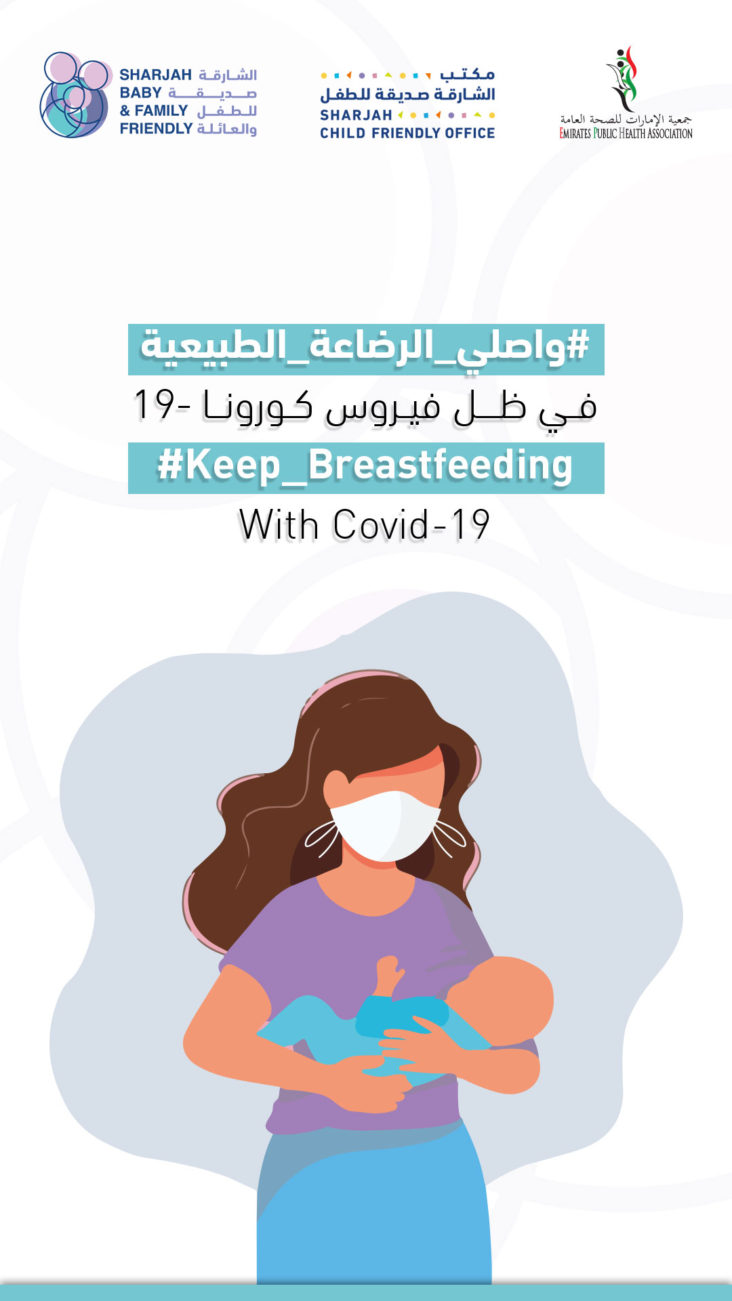Sharjah Child Friendly Office Clarifies Mothers Can Continue Breastfeeding Even If They Have contracted COVID-19

Sharjah Child Friendly Office (SCFO) has launched an awareness campaign aimed at hospitals, health care providers and mothers, which advises them to continue breastfeeding even if mothers have contracted the Coronavirus disease (COVID-19), while taking all necessary safety measures.
The campaign shines light on the World Health Organisation (WHO)’s advisory, which states that to date, the virus has not been found in samples of breastmilk and states that mothers with COVID-19 can breastfeed.
The campaign is supported by the Emirates Public Health Association (EPHA) and comes as part of SCFO’s ‘Sharjah Baby and Family Friendly’ project.
Launched via SCFO’s social media platforms (@sharjahbabyfamilyfriendly), and through direct communication with hospitals, health centres and healthcare providers, the information campaign seeks to send out the message that breastfeeding should be promoted, protected and supported during the COVID-19 outbreak – whether the mother is infected or not – while outlining the standard precautions to be taken in such cases.
Highlighting the objective of the campaign, Dr Hessa Khalfan Al Ghazal, Executive Director of SCFO, said: “The pandemic’s outbreak has sparked the spreading of a lot of misinformation that can jeopardise people’s safety and wellbeing. Keeping in mind how crucial breastfeeding is to a baby’s health and development, SCFO has launched this awareness campaign to provide mothers as well as healthcare providers with the latest and most credible information regarding breastfeeding, breastmilk, and the health and safety of mothers and their babies.”
“According to the World Health Organisation (WHO) as well as other organisations such as the Academy of Breastfeeding Medicine and the International Lactation Consultant Association, limited studies on breastfeeding women with COVID-19 and other coronavirus infections have not detected the virus in breast milk,” she added.
Currently, the primary concern is whether an infected mother can transmit the virus through respiratory droplets. Mothers and caregivers should take precautions to avoid spreading the virus to the infant by washing hands before holding the baby, and wearing a face mask when in close contact with it.
Dr Al Ghazal continued: “In such circumstances, WHO has recommended that a mother with COVID-19 continue breastfeeding or feeding expressed breast milk while taking precautions to avoid spreading the virus to her infant. Breastfeeding is particularly effective against infectious diseases because it strengthens the immune system by directly transferring antibodies from the mother. Hence, we advise mothers to continue breastfeeding their babies, without failing to take standard precautions.”
Dr. Saif Darwish, Community Medicine Specialist, and spokesperson of EPHA, lauded SCFO’s efforts to correct misinformation that may negatively impact mothers and their infants. He noted that EPHA supports all initiatives designed to protect and promote the health and safety of individuals and families.
He said: “Institutional responsibilities have increased as nations do everything possible to safeguard their citizens from the COVID-19 pandemic. It is their duty to adhere to and implement all measures taken by their governments to ensure the safety and wellbeing of their communities. EPHA is supporting this campaign to shield mothers and their infants from the possible indirect impacts of the disease.”
A mother with confirmed COVID-19 or who is a symptomatic person-under-investigation for COVID-19 should take all possible precautions to avoid spreading the virus to her infant, including washing her hands before touching the infant and wearing a face mask, if possible, while feeding at the breast. When expressing breastmilk with a manual or electric breast pump, the mother should wash her hands before touching any pump or bottle parts and follow recommendations for proper pump cleaning after each use. If possible, she should also consider having someone who is not infected to care for and feed the expressed breastmilk to the infant.
Over the years, the Sharjah Baby and Family-Friendly Project (earlier Sharjah Baby Friendly Project), which sought to encourage and support a culture of breastfeeding in the emirate, has succeeded in implementing four community-centred initiatives, and managed to increase the exclusive breastfeeding rate (EBR) in Sharjah from the then baseline of 18 percent in 2012 to at least 60 percent by 2019, exceeding the World Health Assembly’s (WHA) 2025 global target of 50 percent. The project was instrumental in Sharjah being named the world’s first ‘Baby Friendly City’ in 2015 by WHO and UNICEF.
The project was recently expanded a bid to widen the project’s scope to benefit children and ensure their overall holistic wellbeing. The project now covers such vital areas as breastfeeding and adequate nutrition, mental, physical and emotional health, and right parenting.
SCFO, which led Sharjah’s Child Friendly City project, and its recognition by UNICEF to being named a Child Friendly City in 2018 by UNICEF, aims to build on its success in providing advanced infrastructure for childhood services by upscaling and adopting a more holistic approach towards the protection and promotion of the rights of all infants, children and young adults living in the emirate. The Sharjah Baby Friendly City (SBFC) Project was launched by Sharjah in 2012 under the decree of His Highness the Ruler of Sharjah.

